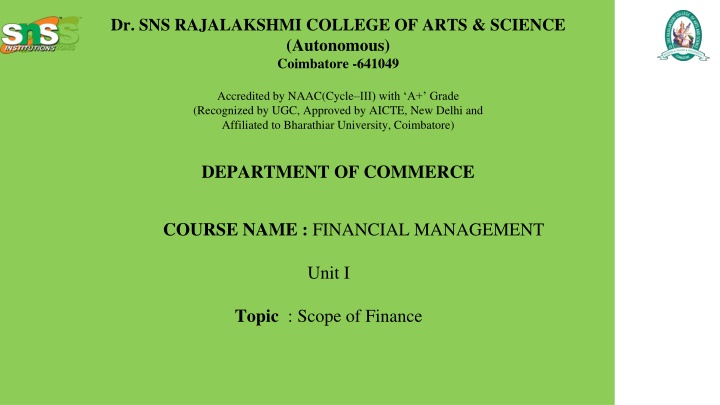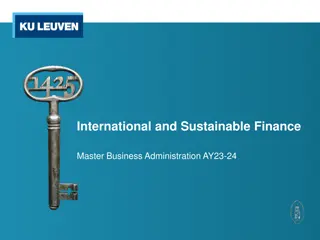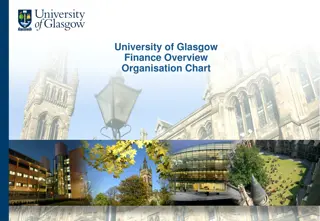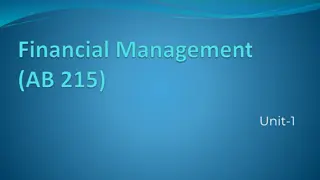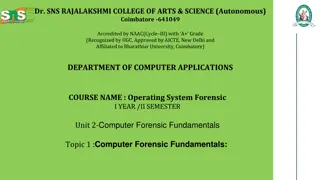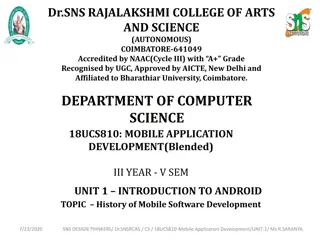Financial Management - Scope of Finance at SNS Rajalakshmi College
"Explore the scope of finance in the Department of Commerce at SNS Rajalakshmi College of Arts & Science in Coimbatore. Accredited by NAAC with A+ Grade, affiliated to Bharathiar University, and approved by AICTE, New Delhi."
Download Presentation

Please find below an Image/Link to download the presentation.
The content on the website is provided AS IS for your information and personal use only. It may not be sold, licensed, or shared on other websites without obtaining consent from the author.If you encounter any issues during the download, it is possible that the publisher has removed the file from their server.
You are allowed to download the files provided on this website for personal or commercial use, subject to the condition that they are used lawfully. All files are the property of their respective owners.
The content on the website is provided AS IS for your information and personal use only. It may not be sold, licensed, or shared on other websites without obtaining consent from the author.
E N D
Presentation Transcript
Dr. SNS RAJALAKSHMI COLLEGE OF ARTS & SCIENCE (Autonomous) Coimbatore -641049 Accredited by NAAC(Cycle III) with A+ Grade (Recognized by UGC, Approved by AICTE, New Delhi and Affiliated to Bharathiar University, Coimbatore) DEPARTMENT OF COMMERCE COURSE NAME : FINANCIAL MANAGEMENT Unit I Topic : Scope of Finance
FINANCIAL MANAGEMENT Financial Management is the process of planning, organizing, directing, and controlling the financial resources of an organization to achieve its goals efficiently. It focuses on utilizing financial resources to maximize profitability, ensure liquidity, and create long-term value for stakeholders. Financial management applies to all types of organizations businesses, governments, and non-profits as well as personal finances. Ms. V Keerthana Dr SNSRCAS
SCOPE OF FINANCE 1. Investment Decisions Capital Budgeting: Deciding on long-term investments in fixed assets like machinery, buildings, and projects. Portfolio Management: Selecting and managing a mix of financial assets to achieve investment objectives. Risk Analysis: Evaluating the risks associated with investments and mitigating them through diversification or hedging. 2. Financing Decisions Capital Structure: Determining the appropriate mix of debt and equity to finance operations and investments. Sources of Finance: Identifying and acquiring funds from various sources like banks, equity markets, and venture capital. Cost of Capital: Assessing and minimizing the cost of raising funds to enhance profitability. 3. Dividend Decisions Profit Distribution: Deciding how much of the profit should be distributed to shareholders as dividends and how much should be retained for future growth. Dividend Policy: Formulating policies for consistent dividend payments, considering shareholder expectations and financial stability. Ms. V Keerthana Dr SNSRCAS
SCOPE OF FINANCE 4. Working Capital Management Short-Term Financing: Managing day-to-day financial needs, including cash, inventory, and receivables. Liquidity Management: Ensuring adequate cash flow to meet short-term obligations and operational needs. Credit Policy: Formulating credit terms for customers and managing accounts receivable. 5. Financial Planning and Analysis Budgeting: Preparing financial plans and budgets to align with organizational goals. Forecasting: Predicting future financial conditions and performance based on historical data and market trends. Performance Evaluation: Monitoring financial performance through key metrics like ROI, profitability, and efficiency ratios. 6. Risk Management Financial Risks: Managing risks such as interest rate fluctuations, foreign exchange risks, and market volatility. Insurance: Protecting assets and operations against unforeseen events through appropriate insurance policies. Hedging: Using financial instruments like derivatives to mitigate risk exposure. Ms. V Keerthana Dr SNSRCAS
SCOPE OF FINANCE 7. Corporate Restructuring Mergers and Acquisitions: Managing financial aspects of mergers, acquisitions, and takeovers. Debt Restructuring: Negotiating with creditors to restructure debt for better terms and sustainability. Asset Management: Optimizing the use of assets for improved financial performance. 8. International Finance Foreign Exchange Management: Handling currency risks and cross-border financial transactions. Global Investments: Evaluating international investment opportunities and managing global financial portfolios. Trade Finance: Facilitating international trade through instruments like letters of credit and export financing. 9. Public Finance Government Budgeting: Managing public revenue and expenditure to achieve economic stability. Tax Policies: Developing tax strategies and policies to optimize government revenue. Debt Management: Handling government borrowings and public debt effectively. 10. Behavioral Finance Studying how psychological factors influence financial decision-making. Understanding the impact of biases and emotions on investment and spending behavior. Ms. V Keerthana Dr SNSRCAS
